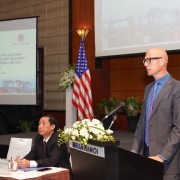Speeches Shim

A risk-based management approach helps customs authorities detect illegal trade by identifying potential fraud based on an analysis of past patterns of some products or trading companies. This helps to minimize fraud and expedite customs clearance. The Government of Vietnam has classified risk management as a commitment, as a component of the World Trade Organization’s Trade Facilitation Agreement, which has not yet been implemented and requires technical assistance.
The Global Competitiveness Report, published by the World Economic Forum annually, ranks countries based on the Global Competitiveness Index (GCI). The GCI reviews factors affecting economic growth in 141 economies and provides a detailed map of the attributes that drive productivity, growth, and human development. The USAID Linkages for Small and Medium Enterprises (USAID LinkSME) project is supporting the Government of Vietnam to explore how the GCI can be applied as a management and evaluation tool to improve the business environment and national competitiveness.
During his trip to Vietnam, Secretary of State Michael R. Pompeo announced an additional $2 million in humanitarian assistance to support response efforts following Typhoon Molave and ongoing severe flooding that has impacted central Vietnam since early October. Typhoon Molave, which made landfall in central Vietnam on October 28, is the ninth tropical storm to hit Vietnam this year and follows weeks of torrential rain and landslides resulting in 174 dead or missing and an estimated 1.5 million people adversely affected. With this new funding, USAID’s Bureau for Humanitarian Assistance and USAID/Vietnam are ramping up efforts to meet emergency needs in communities impacted by Vietnam’s historic typhoon season. It is estimated that the provinces impacted by the flooding are home to over 200,000 persons with disabilities, of whom 61,000 persons with disabilities are directly affected by this disaster.

Vietnam’s business community has been hit hard by COVID-19. Many businesses, especially small and medium enterprises (SMEs), are suffering from revenue loss, suspension of operations, and staff cutbacks. They are struggling to regain their former momentum and continue their operations. To address this, the USAID Linkages for Small and Medium Enterprises (LinkSME) project is working closely with the Government of Vietnam and business support organizations such as the Ho Chi Minh City Investment and Trade Promotion Center (ITPC) to facilitate Vietnamese SMEs’ access to finance and business recovery post-COVID-19. On October 30, USAID LinkSME and ITPC held a workshop on “Supporting Enterprises to Gain Access to Finance for Post-COVID-19 Business Recovery.” Almost 300 participants engaged in the workshop, including international financial institutions, commercial banks, business associations, international development organizations, and enterprises from Ho Chi Minh City and nearby provinces. The workshop was followed by a business matching event where over 50 matches were made between SMEs and financial institutions/commercial banks.
Over the past four years, the USAID Vietnam Low Emission Energy Program (V-LEEP) has worked with the Government of Vietnam (GVN) to develop a Direct Power Purchase Agreement pilot program which will allow businesses to purchase clean power directly from solar and wind generators. It has also supported the Ministry of Industry and Trade to develop Vietnam’s Power Development Plan #8 and worked with government regulators, banks, investors, and private sector developers to facilitate solar investments.

Comment
Make a general inquiry or suggest an improvement.